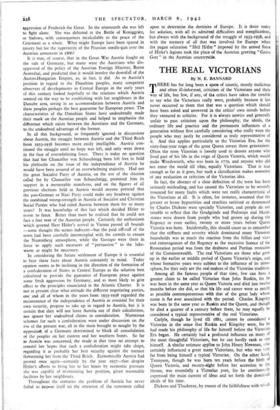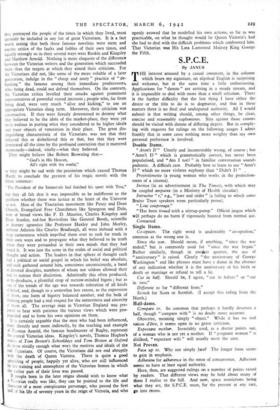THE REAL VICTORIANS
By H. E. BANNARD
THERE has for long been a spate of caustic, mostly malicious and often ill-informed, criticism of the Victorians and their way of life, but few, if any, of the critics have taken the trouble to say who the Victorians really were, probably because it has never occurred to them that that was a question which should have been asked and answered in the critics' own minds before they ventured to criticise. For it is always unwise and generally unfair to pass criticism upon the philosophy, the ideals, the ordinary life and practice and the permanent influences of a generation without first carefully considering who really were the people who may justly be considered as truly representative of it. And this applies particularly to the Victorian Era, for the sixty-four-year reign of the great Queen covers three generations. Often the term Victorian is loosely used to denote anyone who lived part of his life in the reign of Queen Victoria, which would make Wordsworth, who was born in 1770, and anyone who did not enter the world till 1890, equally Victorians. That is true enough as far as it goes, but such a classification makes nonsense of any evaluation or criticism of the Victorian idea.
In fact, the absence of a clear definition of the term has been seriously misleading, and has caused the Victorian's to be severely trounced for many faults which were not really characteristic of the Victorians at all. It is often, for instance, assumed that the greater or lesser hypocrisies and cruelties satirised or denounced by Charles Dickens were specially Victorian, and people do not trouble to reflect that the Gradgrinds and Podsnaps and Murd- stones were drawn from people who had grown up during the Regency or even earlier, twenty or more years before Queen Victoria was born. Incidentally, this should cause us to remember that the stiffness and severity which dominated many Victorian households was as much the reaction from the follies and vices and extravagances of the Regency as the excessive licence of the Restoration period was from the drabness and Puritan restraints of the Commonwealth. The real Victorians are those who grew up in the earlier or middle period of Queen Victoria's reign, and whose formative years were subject to the influence of its atmo- sphere, for they only are the real makers of the Victorian tradition.
Among all the famous people of that time, few can have a greater claim to be called Victorian than John Ruskin, for he was born in the same year as Queen Victoria and died just twelve months before she did, so that his life and career were as nearly as possible contemporaneous with that of the great lady whose name is for ever associated with the period. Charles Kingsley was born in the same year as Ruskin and the Queen, and though he died a quarter of a century before them, he may equally be considered a typical representative of the real Victorians.
Carlyle, though he lived till 1881, cannot be considered 3 Victorian in the sense that Ruskin and Kingsley were, for he had made his philosophy of life for himself before the Victorian Era began. He certainly had a profound influence on many of the most thoughtful Victorians, but he can hardly rank as one himself. A similar estimate applies to John Henry Newman, a who certainly influenced a great many Victorians, but who was verY far from being himself a typical Victorian. On the other hand, Tennyson, though he was born ten years before the birth of Queen Victoria, and twenty-eight before her accession to the throne, was essentially a Victorian poet, for he continuously expressed the main current of ideas and set forth the dominant ideals of his time.
Dickens and Thackeray, by reason of the faithfulness with which they portrayed the people of the times in which they lived, must certainly be included in any list of great Victorians. It Is a fact worth noting that both these famous novelists were stern and caustic critics of the faults and foibles of their own times, and equally strongly so in their several ways were Ruskin and Kingsley and Matthew Arnold. Nothing is more eloquent of the difference between the Victorian writers and the generation which succeeded them than the targets at which they aimed their criticism. For the Victorians did not, like some of the more voluble of a later generation, indulge in the " cheap and nasty " practice of " de- bunking " the famous among their immediate predecessors, who, being dead, could not defend themselves. On the contrary, the Victorian critics levelled their attacks against prominent representatives of powerful vested interests ; people who, far from being dead, were very much " alive and kicking," to use an appropriate Victorian slang term. Moreover, their criticism was constructive. If they were fiercely determined to destroy what they believed to be the idols of the market-place, they were yet more zealous in putting what they considered to be higher ideals and truer objects of veneration in their place. The great dis- tinguishing characteristic of the Victorians was not that they believed this or disbelieved this or that, but that they were dominated all the time by the profound conviction that it mattered mormously—indeed, vitally—what they believed.
They might believe like Robert Browning that- " God's in His Heaven, All's right with the world," or they might be sad with the pessimism which caused Thomas Hardy to conclude the greatest of his tragic novels with the bitter sentence: The President of the Immortals had finished his sport with Tess,"
but they all felt that it was impossible to be indifferent to the problem whether there was justice at the heart of the Universe or not. Men of the Tractarian movement like Pusey and Dean Church, Evangelical Free Churchmen like Spurgeon and Dale, men of broad views like F. D. Maurice, Charles Kingsley and Dean Stanley, red-hot Revivalists like General Booth, scientific or literary agnostics like Professor Huxley and John Morley, militant Atheists like Charles Bradlaugh, all were imbued with a deep earnestness which impelled them ever to seek for truth in their own ways and to propagate what they believed to be truth when they were persuaded in their own minds that they had found it. It was just the same in the realm of social and political thought and action. The leaders in that sphere Of thought each had a political or social gospel in which his belief was absolute, and each gathered around him, sometimes unconsciously, a band of devoted disciples, numbers of whom not seldom allowed their zeal to outrun their disCretion. Admittedly this often produced, as by-Products, a plentiful crop of narrow-minded bigots ; but as one of the trends of the age was towards toleration of all kinds of belief, and, though to a somewhat less extent, to the expression of them, one form of bigotry balanced another, and the bulk of thinking people had a real respect for the earnestness and sincerity of them all. The average man in Victorian England was pre- pared to hear with patience the various views which were pro- pounded and to form his own opinions on them.
It is certainly arguable that the men who had been influenced, mans directly and more indirectly, by the teaching and example of Thomas Arnold, the famous headmaster of Rugby, represent the central Victorian ideas. Kingsley's novels, Thomas Hughes's stories of Tom Brown's Schooldays and Tom Brown at Oxford do show vividly enough what were the motives and ideals of the real Victorians. Of course, the Victorians did not end abruptly with the death of Queen Victoria. There is quite a good sprinkling of people, happily yet alive, who are still influenced by the training and atmosphere of the Victorian homes in which the earlier part of their lives was passed. If people born in the later reigns should wish to know what a Victorian really was like, they can be pointed to the life and character of a most conspicuous personage, who passed the first half of WA' life of seventy years in the reign of Victoria, and who openly avowed that he modelled his own actions, so far as was practicable, on what he thought would be Queen Victoria's had she had to deal with the difficult problems which confronted him. That Victorian was His Late Lamented Majesty King George the Fifth.



























 Previous page
Previous page